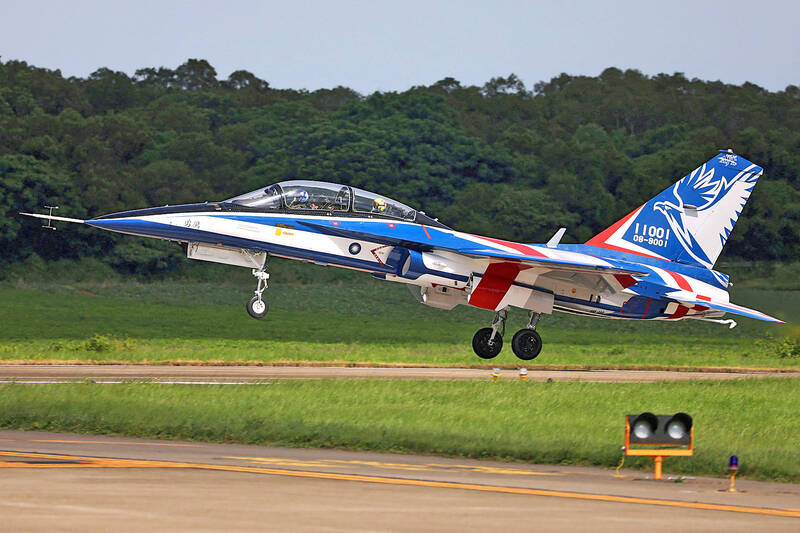The air force has grounded all training jets after an aircraft crashed yesterday due to “dual engine failure,” with the pilot ejecting safely.
The domestically built AT-5 Yung Ying (勇鷹, “Brave Eagle”) advanced jet trainer went down at 8:40am during a training exercise after taking off from Chihhang Air Base in southern Taitung County, the air force said in a statement.
The sole occupant of the two-seater jet trainer, air force Major-in-Training Lin Wei (林瑋), ejected and parachuted to safety after both aircraft’s engines failed, it said.

Photo: Ann Wang, Reuters
The 34-year-old Lin displayed mild signs of hypothermia following his rescue and was under observation at Mackay Memorial Hospital’s Taitung branch, doctors said.
Lin’s jet had recorded 183 hours of flight time prior to yesterday, the air force said.
Lin graduated from the Air Force Academy and had clocked a total flight time of 1,184 hours before the crash.
The air force said the jet had “dual engine failure,” but a special task force would investigate “to clarify the cause and ensure training safety.”
Yesterday’s incident was the first time a Brave Eagle had an accident since the air force began receiving the planes from Aerospace Industrial Development Corp (AIDC, 漢翔航空) in 2021 to replace its aging AT-3 jet trainers.
AIDC has delivered 41 out of 66 Brave Eagles ordered by the air force. The remaining aircraft are scheduled to be delivered by the end of next year.
Yesterday’s crash could be a setback for air force plans to replace the aging AT-3 fleet before the end of next year, sources said.
The armed forces are mostly equipped by the US, but the government has made the development of an advanced homegrown defence industry a priority, especially as China steps up military modernization efforts and drills near Taiwan.
In February 2017, the Ministry of National Defense initiated the development of the Advanced Trainer Jet program. The aircraft received the name “Brave Eagle” in September 2019 when the first prototype rolled off the assembly line.
The first AT-5 flight was in June 2020 and AIDC delivered the first sample of the mass-production model in November 2021.
The AT-5 is Taiwan’s first domestically made since the F-CK-1 Ching-kuo Indigenous Defence Fighter, or IDF, rolled out more than three decades ago. The two jets look similar and have similar capabilities.
Despite AT-5’s external resemblance to the F-CK-1 air superiority fighter — a deliberate design choice to replicate the latter’s drag and angle of attack — 80 percent of the former’s components are different.
Significantly, the AT-5 uses a pair of AIDC/ITEC F124-200TW engines which feature lightweight composite materials, with 55 percent of parts sourced in Taiwan.
The AT-5 wings were modified to enable low-speed landing and stability at low airspeeds, desirable attributes for training.
The plane is designed to have a support function in times of war. It can be equipped with weapons, but that function remains in the testing phase.

AGING: As of last month, people aged 65 or older accounted for 20.06 percent of the total population and the number of couples who got married fell by 18,685 from 2024 Taiwan has surpassed South Korea as the country least willing to have children, with an annual crude birthrate of 4.62 per 1,000 people, Ministry of the Interior data showed yesterday. The nation was previously ranked the second-lowest country in terms of total fertility rate, or the average number of children a woman has in her lifetime. However, South Korea’s fertility rate began to recover from 2023, with total fertility rate rising from 0.72 and estimated to reach 0.82 to 0.85 by last year, and the crude birthrate projected at 6.7 per 1,000 people. Japan’s crude birthrate was projected to fall below six,

US President Donald Trump in an interview with the New York Times published on Thursday said that “it’s up to” Chinese President Xi Jinping (習近平) what China does on Taiwan, but that he would be “very unhappy” with a change in the “status quo.” “He [Xi] considers it to be a part of China, and that’s up to him what he’s going to be doing, but I’ve expressed to him that I would be very unhappy if he did that, and I don’t think he’ll do that. I hope he doesn’t do that,” Trump said. Trump made the comments in the context

SELF-DEFENSE: Tokyo has accelerated its spending goal and its defense minister said the nation needs to discuss whether it should develop nuclear-powered submarines China is ramping up objections to what it sees as Japan’s desire to acquire nuclear weapons, despite Tokyo’s longstanding renunciation of such arms, deepening another fissure in the two neighbors’ increasingly tense ties. In what appears to be a concerted effort, China’s foreign and defense ministries issued statements on Thursday condemning alleged remilitarism efforts by Tokyo. The remarks came as two of the country’s top think tanks jointly issued a 29-page report framing actions by “right-wing forces” in Japan as posing a “serious threat” to world peace. While that report did not define “right-wing forces,” the Chinese Ministry of Foreign Affairs was

PREPAREDNESS: Given the difficulty of importing ammunition during wartime, the Ministry of National Defense said it would prioritize ‘coproduction’ partnerships A newly formed unit of the Marine Corps tasked with land-based security operations has recently replaced its aging, domestically produced rifles with more advanced, US-made M4A1 rifles, a source said yesterday. The unnamed source familiar with the matter said the First Security Battalion of the Marine Corps’ Air Defense and Base Guard Group has replaced its older T65K2 rifles, which have been in service since the late 1980s, with the newly received M4A1s. The source did not say exactly when the upgrade took place or how many M4A1s were issued to the battalion. The confirmation came after Chinese-language media reported